May 16, 2025 | 10:46 GMT +7
May 16, 2025 | 10:46 GMT +7
Hotline: 0913.378.918
May 16, 2025 | 10:46 GMT +7
Hotline: 0913.378.918
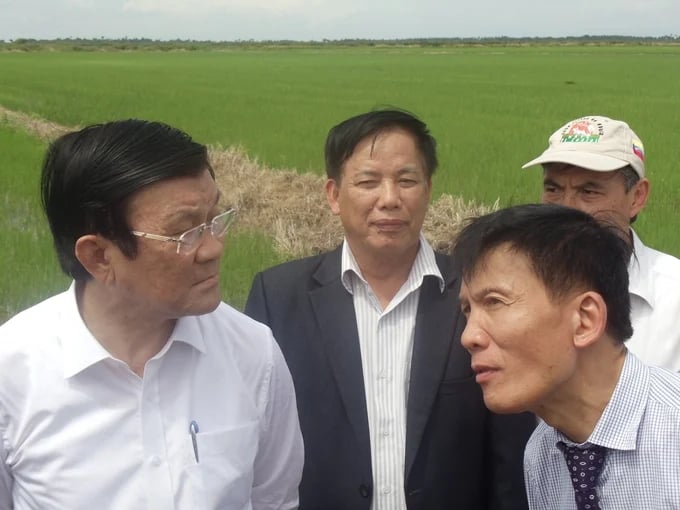
Former President Truong Tan Sang visited the Vietnam-Cuba Cooperation Project on household-scale rice production phase 4 (Photo courtesy of Dr. Le Vinh Thao).
In the realm of creating rice varieties in Vietnam, a dichotomy of advantages and challenges exists, as Dr. Le Vinh Thao outlined. With a rich tradition of breeding rice varieties, Vietnam has achieved significant milestones, elevating rice productivity from 2-3 tons/ha to 5-6 tons/ha. Creating pure rice varieties yielding 7-8 tons and hybrid rice reaching 8-9 tons/ha signifies a robust foundation for scientific research in rice varieties.
The advantages stem from a well-established research foundation and tradition. This is a fundamental advantage for educational institutions, research agencies, and training centers to synthesize theoretical knowledge, molding it into materials for further research. Additionally, the state has implemented supportive policies encompassing facilities, budget investments, and financial aid. These measures provide officials, institutes, schools, and companies with the necessary conditions to conduct research. Furthermore, Vietnam's strong international collaborations in this field have accumulated valuable experience in rice breeding, fostering the creation and development of key regions for high-quality rice production.
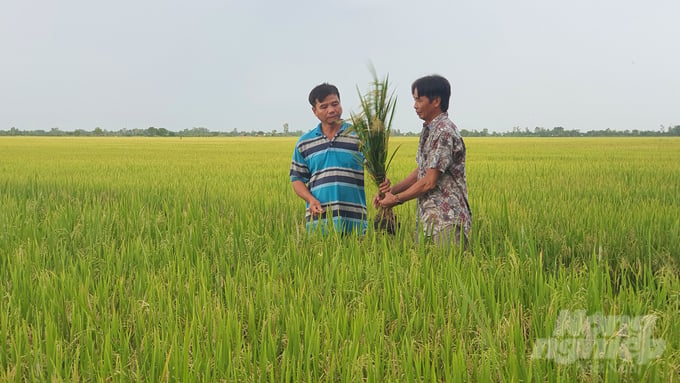
Breeding researchers are the people who sacrifice silently, standing behind the rice plant. Photo: K. Trung.
However, in the eyes of Dr. Le Vinh Thao, challenges persist. The absence of a synchronized mechanism and a lack of a connected chain between the three key stakeholders—scientists, farmers, and manufacturers—hinder progress. This disconnect spans from using raw materials to creating breeding lines, evaluation processes, and applications for expansive development. Even among research agencies, existing relationships and links are fragmented, presenting a barrier to cohesive advancement in rice breeding.
Another significant limitation in rice science is the financial compensation for those dedicating their efforts to advancing knowledge. Dr. Le Vinh Thao highlighted that researchers predominantly work out of passion, as the current salary structures are inadequately low to sustain a livelihood.
Despite these challenges, Mr. Thao staunchly affirmed, "The achievements we have attained are remarkable. While other countries make substantial investments, their products reach only a certain level. With comparatively lower investment, Vietnam boasts numerous high-quality rice varieties and rice products of global acclaim. We should take pride in that."
As the "father" of three renowned sticky rice varieties selected in the 1990s and still widely cultivated today, Dr. Le Vinh Thao stands among the distinguished scientists who have made significant contributions to the agricultural industry.
In the domain of sticky rice breeding, Dr. Thao noted the preservation and ongoing production of three sticky rice lines selected by his generation. These include N97, a sticky rice variety bred in 1997, characterized by a short growth period, high yield, and broad adaptability. N97 has existed for 20 years and has recently been extended for another decade. The second variety, BM 9603, is a fragrant sticky rice with high yield, also maintaining popularity for approximately two decades. The third is the N98 variety, derived from the original N87 variety, enhanced to exhibit increased height, improved disease resistance, and initially designated N87-2. Following successful trial production, it earned recognition as a national rice variety, and upon entering the public domain, it was officially named N98. Presently, N98 is authorized by the Center for Technology Transfer - Agricultural Extension for production and distribution to various localities and companies.
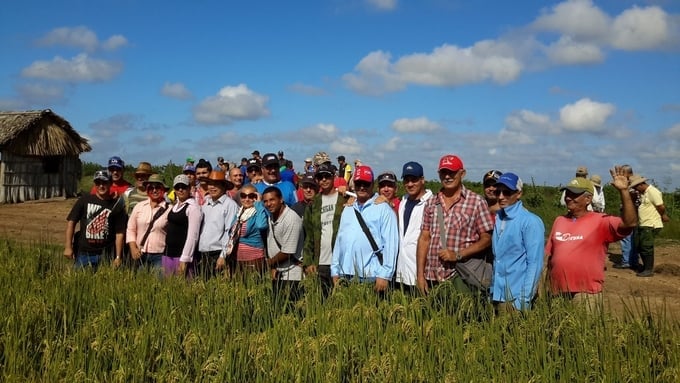
Class on rice-intensive farming techniques by Vietnamese experts for rice production staff at Granma Cuba (Photo courtesy of Dr. Le Vinh Thao).
"Scientists like us have a simple wish—that well-developed rice varieties become widely applied, benefiting as many people as possible. The broader the usage, the better. For instance, by transitioning from an older variety with a yield of only 8 tons/ha to a new variety boasting an 8.5 tons/ha yield, a 5-ton/ha increase, the potential profit becomes substantial when multiplied across thousands of hectares," shared Mr. Thao.
He stressed the need for concerted efforts in agricultural extension and support to facilitate the integration of new varieties into production, especially focusing on pure breeds, original breeds, and super pure breeds. Furthermore, Mr. Thao highlighted the crucial role of media outlets in disseminating information. Propagating the success of new varieties encourages widespread adoption and serves as a source of motivation for the researchers behind these innovations.
"In many countries, significant investments in scientific research lead to relatively dignified lives for researchers, thanks to government policies and support from various organizations and individuals. Some countries allocate as much as 2% of their budget to research. In the United States, there's the Rockefeller Foundation; in Thailand, the Thai King Fund. In our country, the focus on investment remains relatively modest compared to other nations—a factual reality," Mr. Thao reflected.
Drawing from his experience in Thailand, he observed that experts and scientists in the country enjoyed stable incomes, providing them with a dignified life and fostering undivided attention and commitment to scientific research. However, he emphasized, "Countries may invest extensively in research, but it must be acknowledged that the results achieved do not match the accomplishments of Vietnam. Despite our lower investment, our achievements are monumental."
In the Vietnamese context, researchers often prioritize impact over personal rights, making silent sacrifices for the greater good. Their primary desire is for their products to be recognized and applied by farmers in their daily lives.
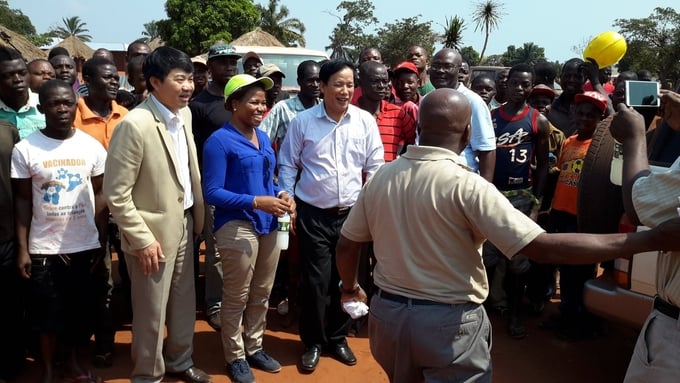
Discussion on developing irrigated rice areas in Lukembo, Malage, Angola, between Vietnamese experts, businesses, and local Angolan officials (Photo courtesy of Dr. Le Vinh Thao).
"Agricultural enterprises in Vietnam have recently achieved significant milestones. They are building upon the results of scientific research, continuing and developing the foundation laid by researchers, funded by the state.
The ultimate purpose of research is to serve production and benefit farmers, which excites scientists," he analyzed.
Responding to the question about his expectations for establishing an Investment Fund for scientific research and support for scientists, Dr. Le Vinh Thao shared his perspective: "After Vietnam is globally recognized for having the best rice varieties and its reputation increases, it's likely that someone will take the initiative to create funds to support and sponsor rice seed research. Personally, I strongly support and welcome such an initiative. Establishing a national-level Fund by the President would be immensely valuable, bringing scientists joy and enhancing their motivation."
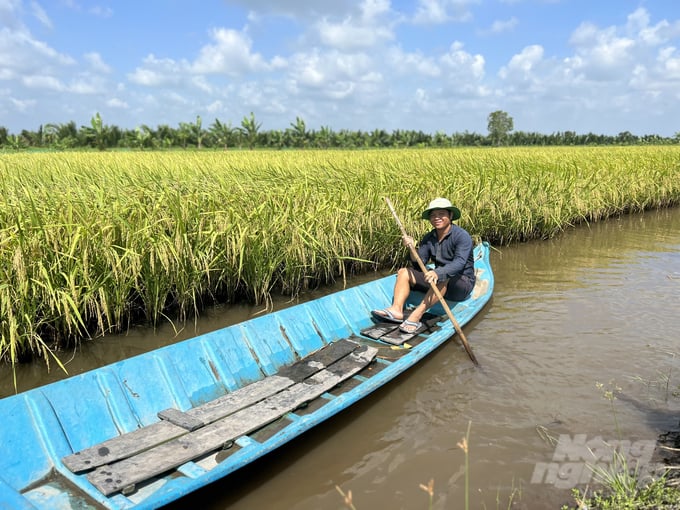
Growing ecological rice in the Mekong Delta. Photo: Trong Linh.
As one of the researchers involved in breeding, alongside leading scientists like Mr. Son (Labor Hero, Dr. Ta Minh Son), Mr. Quy (Prof. Dr. Tran Duy Quy), Ms. Tram (Labor Hero, Dr Nguyen Thi Tram), our generation has devoted efforts to creating many promising rice lines. These lines are then regionalized and recognized as national rice varieties, subsequently introduced to localities, and assigned to companies for mass production. At that time, no one contemplated copyright issues. My greatest wish is for the rice variety I researched to be applied and developed in production – that is true happiness.
The N98 variety, selected by a group of authors including Le Vinh Thao, Bui Cong Ruan, Nguyen Duy Bao, Nguyen Huu Nghia, Ta Minh Son, Nguyen Van Vuong, and colleagues from the Institute of Food Crops and Food Crops - Academy of Science Vietnamese culture. The sticky rice variety N98, or N87-2, was introduced in 1987. Between 1988 and 1999, it underwent individual selection, with experimental observation and evaluation occurring from 2000 to 2007. From 2005-2008, it underwent national testing, and in 2006-2008, production was expanded."
Translated by Quynh Chi

(VAN) Cold-barn systems efficiently manage environmental and temperature conditions, which aids in the prevention of respiratory diseases in pigs and protects them from the vectors that transmit African swine fevers.

(VAN) To tackle challenges, the project 'Addressing key technical bottlenecks in the grouper supply chain in Vietnam' has been underway since 2024.

(VAN) The project 'Disease-Resilient and Sustainable Cassava Production Systems in the Mekong Region', funded by the Australian Center for International Agricultural Research (ACIAR), is being implemented from 2024 to 2028.

(VAN) Data from 10,000 farming households will help professionalize production organization and support the implementation of the One Million Hectares Program for High-Quality, Low-Emission Rice Cultivation.

(VAN) FAO Director-General QU Dongyu marks International Day of Plant Health at NENA conference.

(VAN) Deputy Minister of Agriculture and Environment Hoang Trung affirmed that floriculture and ornamental plants are a growing industry that receives significant global attention.

(VAN) The three staple crops dominating modern diets – corn, rice and wheat – are familiar to Americans. However, fourth place is held by a dark horse: cassava.